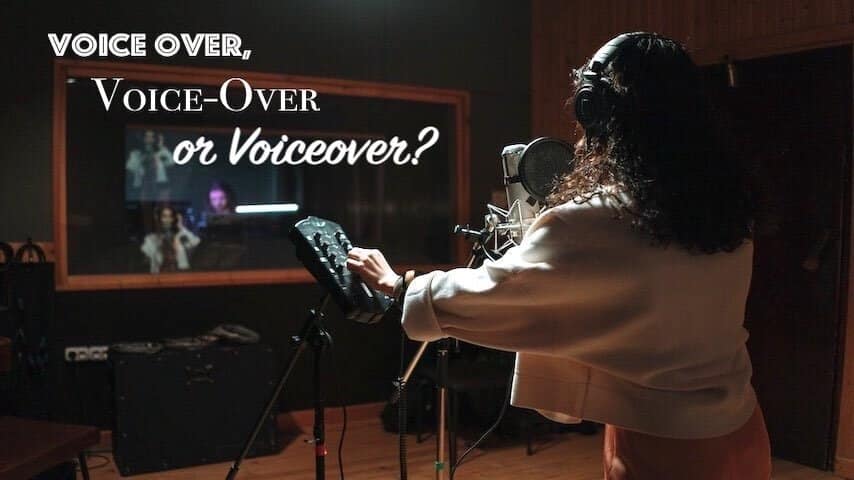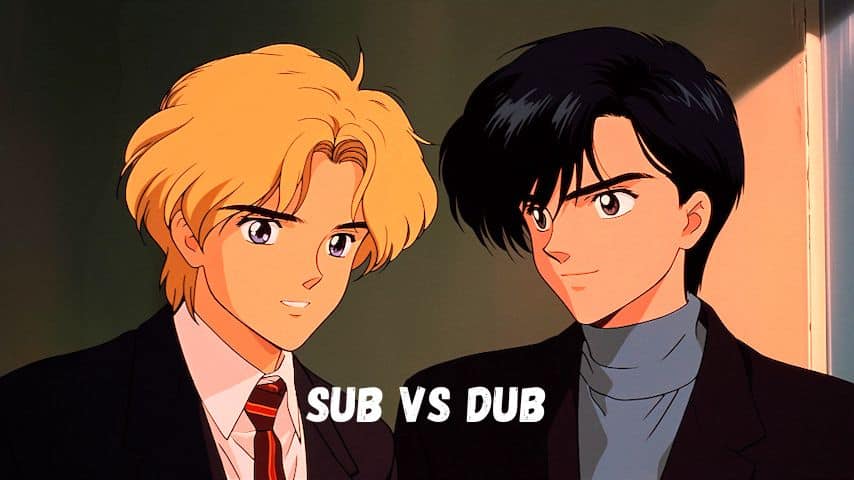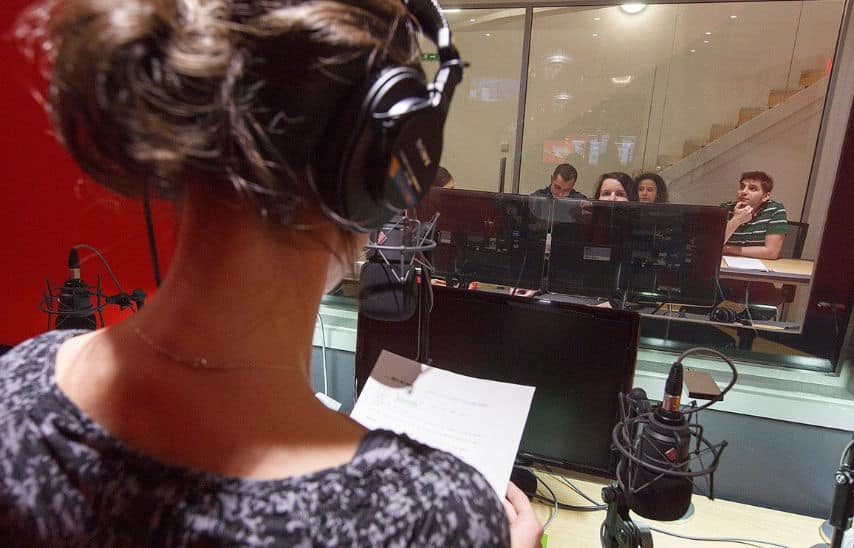Voice over, voice-over, and voiceover are all terms commonly used in media production to refer to recorded voice narration or dialogue that accompanies a visual element, such as a film, TV show, advertisement, or video game. Despite being similar in meaning, we often use these terms interchangeably. This means they can cause confusion among those new to the industry. Understanding the differences between voice over, voice-over, and voiceover can be crucial in choosing the appropriate spelling for your project and conveying the right tone and message to your audience. In this article, we’ll explore the different uses and spellings of these terms. We also offer insights on how to choose the right one for your next creative project.
Table of Contents
ToggleThe Uses of Voice Over, Voice-Over, and Voiceover
Voice over, voice-over, and voiceover are all essential components of many types of media. Media such as film, television, radio, advertising, and video games. In film and television, we use voice over to provide context or to establish a mood or tone. It can even give insight into a character’s thoughts or feelings. Voice-over, however, you’ll see used in a more active and dynamic way, serving as a commentator on the action. You can use voiceover, a more recent term, to encompass both voice over and voice-over. You can use it interchangeably with either term.
In advertising, you might see voice over used to create a particular brand identity, while also conveying information about a product or service. In video games, we use voice-over and voiceover to provide narration or dialogue for characters. This gives players a more immersive and engaging experience.
By using voice over, voice-over, and voiceover strategically, media producers can enhance the storytelling, branding, and marketing efforts of their projects. These techniques can help to create a more engaging and memorable experience for the audience. They also convey important information in a way that is both clear and entertaining.
Spellings of Voice Over, Voice-Over, and Voiceover
The spellings of voice over, voice-over, and voiceover have evolved over time. They vary depending on the region or industry. In general, voice over and voice-over you’ll see most commonly in North America. However, voiceover is more common in the UK and other parts of Europe. However, all three terms are widely used. You can use them interchangeably in many cases.
One question that often arises is whether to use the hyphen in voice-over. While there’s no strict rule, the hyphen generally creates a more formal appearance. So, for example, some may prefer to be referred to as a voice-over artist rather than a voiceover artist.
Another common question is what the short form of voice over is. The most common short form is VO. We often use this in scripts and production notes to refer to voice over or voice-over.
As for spelling differences between the UK and USA, the hyphen is generally more common in the USA. However, in the UK it is more common to use the closed spelling, voiceover. However, as mentioned earlier, all three spellings are widely used and accepted in both regions.
In summary, whether you use voice over, voice-over, or voiceover, choose the spelling that best fits your industry conventions. All three spellings are widely accepted. The choice is ultimately up to the writer or producer.
Get Top-Notch Voices
Whatever you call it, GoLocalise delivers top-notch voice-over services for your needs.
Choosing the Right Spelling for Your Project
When deciding which spelling to use for your voice work project, it’s important to consider the intended audience, tone, and context. Here are some tips for choosing the right spelling:
- Consider your target audience. If you’re aiming your project at a global audience, you should use the most widely accepted spelling, voiceover. If your audience is primarily in the USA, using the hyphenated spelling, voice-over, may be more appropriate.
- Think about the tone of your project. If your project is more formal or professional in nature, using the hyphenated spelling, voice-over, may help convey that tone. If your project is more casual or conversational, using voice over, may work better.
- Look at the context of your project. If you are referring to a specific job title or description, using the hyphenated spelling, voice-over, may make more sense. If you are referring to the overall concept of adding voice to a production, use the closed spelling, voiceover.
Ultimately, the choice between voice over, voice-over and voiceover will depend on your project’s specific needs and goals. Here are some examples of projects that have successfully used each spelling:
- The animated movie used voice-over to provide a more professional and formal tone in the narration.
- The commercial used voiceover to create a more conversational and approachable tone for their product.
- The video game used the closed spelling, voiceover, to refer to the overall concept of adding voice to the game.
By considering your audience, tone, and context, you can choose the spelling that best fits your project.
Conclusion
In conclusion, understanding the differences between voice over, voice-over, and voiceover is crucial for anyone involved in media production, whether it’s film, television, radio, advertising, or video games. By exploring the various uses of these terms and the different spellings, you can make informed decisions that help enhance your storytelling, branding, and marketing efforts.
Whether you’re in the studio creating a commercial, a documentary, or a video game, the right choice of voice talent can make all the difference. Working with a professional voice over artist who understands your project and your goals can help you create a more engaging and impactful production.
So, remember to choose the appropriate spelling of voice over, voice-over, or voiceover based on your target audience, tone, and context. And always seek out the voice-over services of experienced voice over artists to help bring your project to life.
By following these tips and insights, you can create media projects that truly stand out and capture the attention of your audience.
FAQs
What is the difference between voice over, voice-over, and voiceover?
Voice over and voice-over are often used in North American English, with voice over providing context or mood in media and voice-over serving as active commentary. Voiceover, more commonly used in UK English, is a recent term that can be used interchangeably with the other two.
When should I use the hyphen in voice-over?
There’s no strict rule, but the hyphenated form, voice-over, tends to give a more formal appearance. It’s more common in the USA and for professional or formal projects.
What is the short form for voice over?
The most common abbreviation is VO, which is used in scripts and production notes.
Are there regional preferences for these terms?
Yes, in the USA, voice over and voice-over are more common, whereas voiceover is preferred in the UK and Europe. However, all terms are widely accepted in both regions.
How do I choose the right spelling for my project?
Consider your target audience, the tone of your project, and the context. Voiceover is more universal, while voice-over might suit a more formal tone or professional setting. Voice over may be better for casual or conversational contexts.
Can the spelling of voice over affect the tone of my project?
Yes, the spelling can influence the perceived tone. Voice-over might imply formality, while voiceover is more modern and potentially more conversational.
Is there a standard spelling for voice work in media production?
No, there is no standard spelling; the choice between voice over, voice-over, and voiceover depends on industry conventions, regional preferences, and the specific needs of the project.
Why is it important to choose the correct spelling of voice over for a project?
The correct spelling can help convey the intended tone, professionalism, and can be an important aspect of branding and audience perception.
What should I consider when hiring a voice over artist?
You should consider the project goals, the intended audience, and the desired tone. Working with a professional voice over artist who understands these elements can significantly impact the success of your project.
How can I ensure my media project captures the audience’s attention?
By choosing the appropriate spelling for voice work and hiring experienced voice over artists who align with your project’s goals, you can create engaging and impactful media content.






















